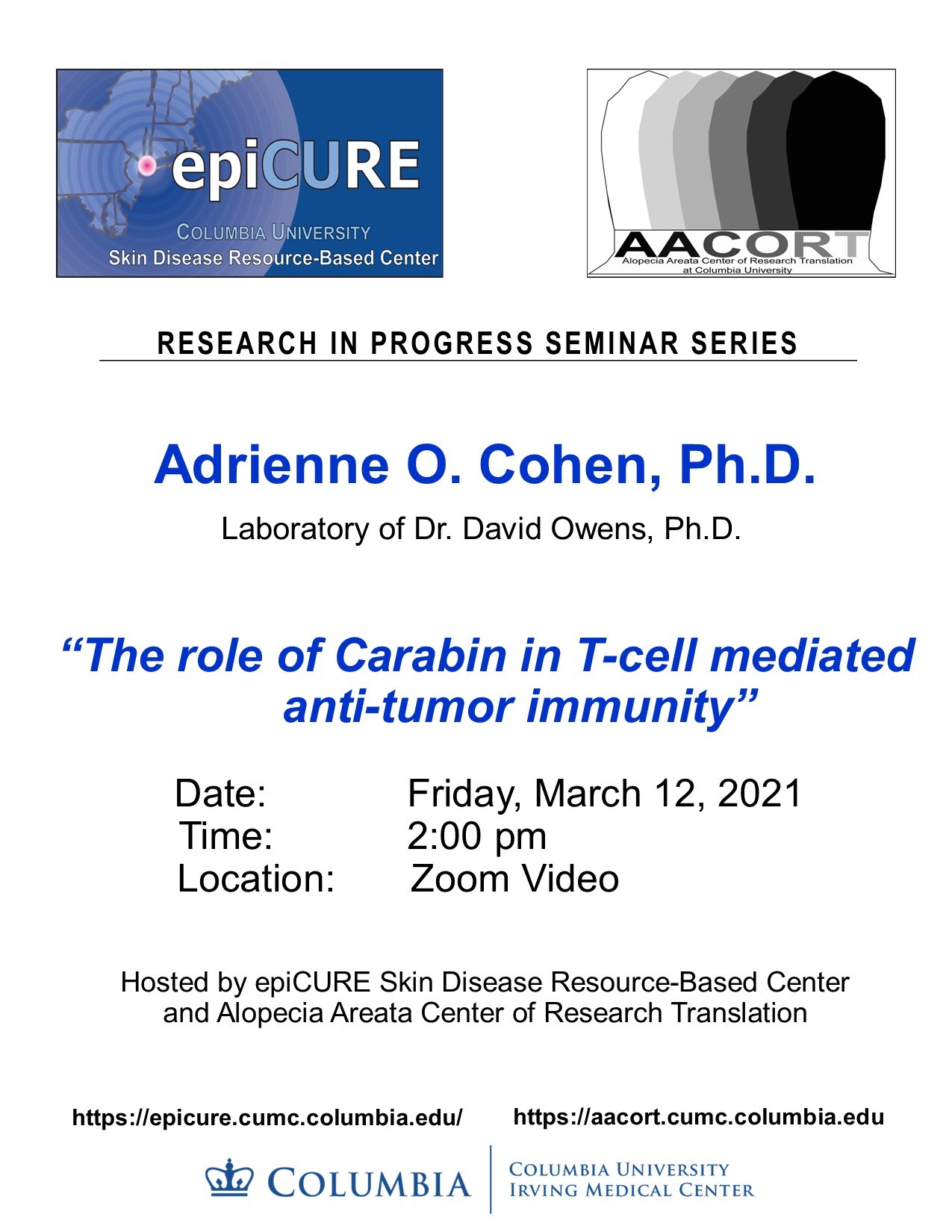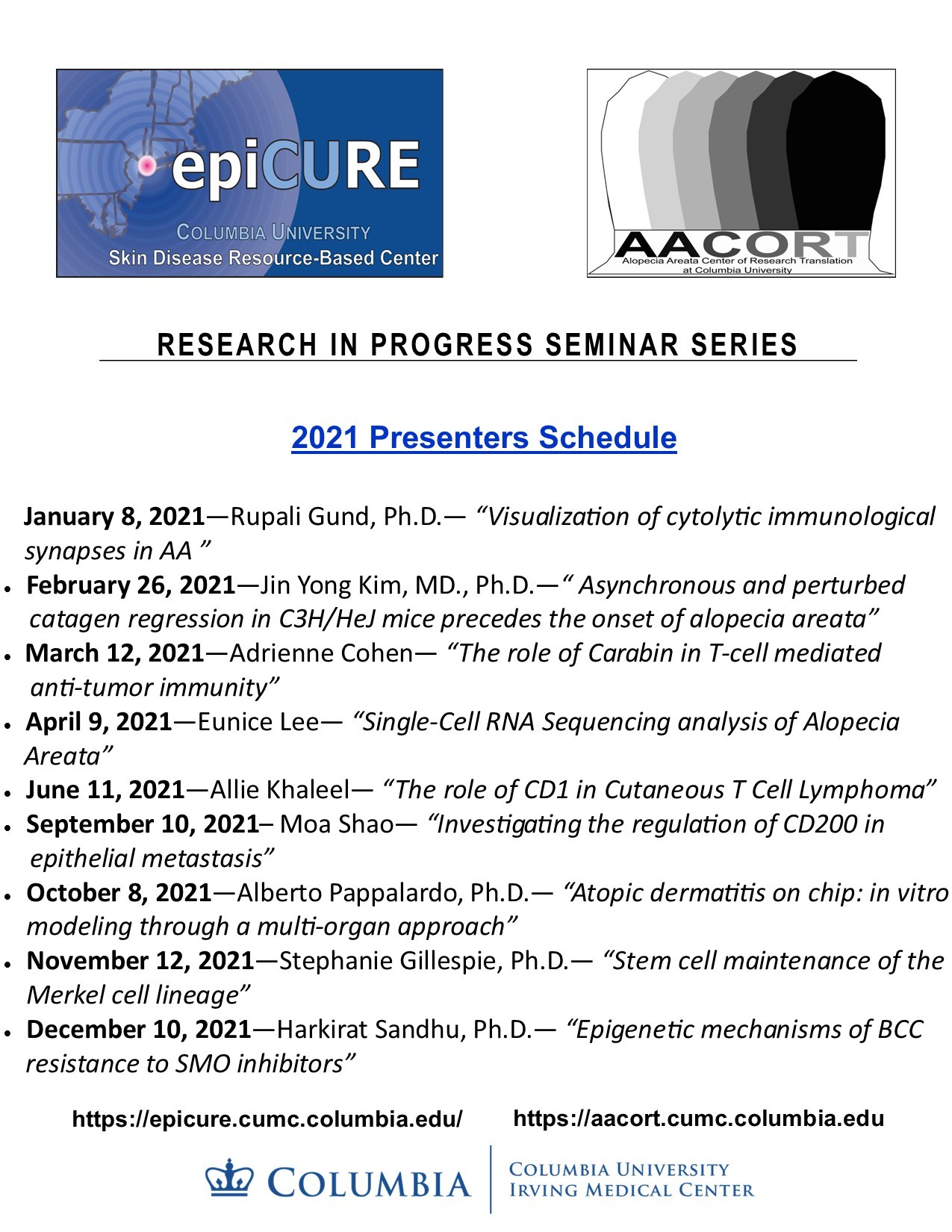Translational Rotations in epiCURE Laboratories
To increase hands-on training in translational dermatologic research, research fellows will be encouraged to perform translational research rotations in epiCURE laboratories. The goal of these rotations is to familiarize clinical trainees with state-of-the-art investigative approaches in dermatological research, and to provide training in basic aspects of experimental design, including the use of appropriate controls, blinded studies and the need to plan for cohort sizes that allow for adequate statistical power. Several epiCURE investigators have already hosted residents for such rotations including Drs. Christiano, Owens and Bickers.
Medical Student Projects
A new innovative feature of the Enrichment Program at CUMC is the inclusion of a research project opportunity for first- and fourth-year medical students. Through NIH T35-supported programs, medical students between their first and second years perform eight-week, hands on projects in epiCURE labs. Since 2013, epiCURE investigators have hosted six CUMC medical students engaged in skin-focused research. Of these, four first year students have received NIH T32 training awards and one student, Ms. Sophie Greenberg, has gone on to win prestigious Dean’s Research Fellowships, which has allowed her to perform a full year of focused research between her third and fourth years of medical school. In addition, CUMC has now made it a mandatory requirement for fourth year medical students to perform a minimum of four months of a scholarly project, which can be conducted in epiCURE laboratories. Since 2013, seven CUMC medical students have performed their scholarly projects in epiCURE investigator labs.
Technology Series Workshops
To inform epiCURE investigators and trainees of exciting new technologies, the Center will host periodic technology-focused seminars. The purpose of these sessions will be to keep investigators up-to-date on innovations that have been or will be adopted in the Research Cores. These can take the form of seminars or hands-on workshops in collaboration with industry partners. Drs. Owens and Kim will spearhead this series.
New York Skin Biology Club
The New York Skin Biology Club was developed by Dr. Angela Christiano and Dr. Marjana Tomic-Canic formerly at NYU, in an effort to exploit the diverse array of talented research investigators in cutaneous biology in the New York metropolitan area. The mission of the New York Skin Biology Club is to organize a scientific meeting twice a year, in the format of an informal symposium, to promote scientific interactions across institutions and to learn about ongoing research activities in other laboratories. It also affords an opportunity for our young people to get to know one another and the PIs, and to welcome investigators from all areas of epithelial biology. The Skin Club is now co-Organized by Dr. Christiano together with Dr. Elaine Fuchs at the Rockefeller University and take place twice per year. Other NYC Resources available to epiCURE include the NY Genome Center, the NY Academy of Sciences, the NY Academy of Medicine, the NY Structural Biology Center, and the Harvey Society Lecture Series at the Rockefeller University.
Global Enrichment Program
The Global Skin Disease Research Consortium (GSDRC) was founded in 2013 with the goal of fostering cooperation among several leading skin research institutions around the world, including Columbia University, Keio University in Tokyo, University of Colorado in Denver, Dundee University and University of Cologne, Germany. The long-term goal of the GSDRC is to provide joint opportunities to foster the creation of novel approaches and insights into cutaneous biology, disease pathogenesis and clinical dermatology by coordinating multidisciplinary research aimed at finding innovative translational approaches to improve the care of patients with skin disease as well as to train the scientific leaders of tomorrow (http://www.sfb829.uni-koeln.de/global-skin-diseases-research-consortium-gsdrc/) (Please see letter of intent for GSDRC in the Appendix). The research activities in New York, Tokyo, Denver, Dundee, and Cologne are in many ways complementary in their emphasis on pathways and/or approaches. Several robust training opportunities exist within the SDRC, in particular, a bi-annual summer school for PhD student and postdocs. The first was held in July 2014 in Denver, and the next will be held in the summer of 2016 in Singapore. Exchange of students and postdocs promotes collaborative projects and facilitates collaborations, and allows innovative methods and techniques to be infused into the epiCURE Cores from open exchange of models, reagents and protocols from colleagues in this Consortium.
The next planned epiCURE Symposium is entitled "Advancing Precision Medicine in Dermatology", and will take place in the summer-fall of 2021. This Symposium was developed because the widespread availability of massive amounts of biomedical data at all scales (from cellular up through human populations) is revolutionizing the practice of medicine. This symposium will highlight state-of-the art resources and methods in data analysis with the global of disseminating opportunities to advance precision medicine in the setting of the skin biology and disease. The Symposium will be hosted by the COMP Core of epiCURE.

